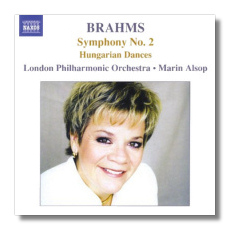
The Internet's Premier Classical Music Source
Related Links
- Latest Reviews
- More Reviews
-
By Composer
-
Collections
DVD & Blu-ray
Books
Concert Reviews
Articles/Interviews
Software
Audio
Search Amazon
Recommended Links
Site News
 CD Review
CD Review
Marin Alsop Conducts

Leonard Bernstein
- Serenade for Solo Violin, Strings, Harp and Percussion
- Facsimile – Choreographic Essay for Orchestra
- Divertimento for Orchestra
Philippe Quint, violin
Bournemouth Symphony Orchestra/Marin Alsop
Naxos "American Classics" 8.559245


Johannes Brahms
- Symphony #2
- Hungarian Dances: #1, 3, 10, 17, 18, 19, 20, 21
London Philharmonic Orchestra/Marin Alsop
Naxos 8.557429
This pair of discs documents the continued rise of American conductor, Marin Alsop. Not that the music isn't the main thing here – indeed, this collection of Bernstein works and the Brahms Second Symphony and Hungarian Dances are quite substantial offerings, and potential buyers will want to weigh the merits of the performances, whether they know – or even care – about the career aspects of the conductor. Alsop, for those who do care, will be taking over the podium of the Baltimore Symphony Orchestra in 2007, becoming the first woman conductor of a major American symphony orchestra, despite a bit of controversy generated by the move: the ensemble's players were not altogether satisfied with her selection and wanted to continue the search for a new music director. I predict her tenure in Baltimore will be a successful one, and that she will move on to an even more prestigious appointment, either here or in Europe.
Anyway, on to the performances at hand. Alsop, a Bernstein protégée, delivers excellent readings here, and while she may be challenged or possibly outdone in these individual works, especially by the composer's recordings, she scores a major triumph nonetheless with consistently insightful and sparkling renditions. Philippe Quint seems an ideal soloist in the Serenade, and the Bournemouth Symphony Orchestra plays with all the color and vigor one could want.
Funny, but for all the lightness and intense emotionalism in Bernstein's music, its inspiration often came from the most seemingly incongruous sources. In the case of the Serenade, it's Plato's Symposium; and this ancient work and Bernstein's piece are both about love, or giving "praise to love". It's easy to see why Bernstein felt so artistically fulfilled by this marvelous piece, one of his most thematically and harmonically sophisticated creations.
Facsimile and the Divertimento are also given compelling performances. The latter piece is surely one of the most colorful and witty ever written by Bernstein. For one thing, there are many deft allusions to, or quotations from, other composers' works, including Strauss' Till Eulenspiegel and Beethoven's Fifth Symphony. Listeners unfamiliar with the piece can sit back and see how many of these they can identify. All in all, this piece is pure fun, and the whole disc, with its vivid sound reproduction and splendid performances must rate an enthusiastic recommendation.
With Brahms, of course, we enter an entirely different world, but one which Alsop also knows quite well too. This is the second installment in her ongoing Brahms symphony cycle, a cycle presenting the works in order, with each symphony being paired with filler material.
This Second is muscular and energetic: the first movement comes across with the requisite mixture of sunshine, epic sweep and sense of urgency (relatively innocuous harmonies can take on disruptive qualities and jar you; and anxious rhythms can often propel you along excitedly); the second movement is romantic and warm, but, again, with secondary material divulging greater importance in the overall musical fabric; the third movement is perky and witty in its outer sections, joyously breathless in its inner panel; the finale rounds the performance with a sense of inevitability, moving from the unrestrained ebullience and serenity of its opening sections onto the stormy developmental core, then concluding with resounding triumph, the whole realized brilliantly by Alsop and her London players. Walter, Doráti, Wand, Levine and many others have produced fine cycles of the Brahms symphonies, but thus far Alsop is etching out her own quite distinctive take on the four masterpieces and may well take her place alongside these.
The selection of Hungarian Dances make an attractive, colorful bonus here. The sound reproduction is excellent throughout and the booklet notes, by Robert Pascall, are informative. Among standard-repertory items, this rendition of the Brahms Second Symphony is perhaps the finest recording yet by Alsop. Strongly recommended.
Copyright © 2006, Robert Cummings




















